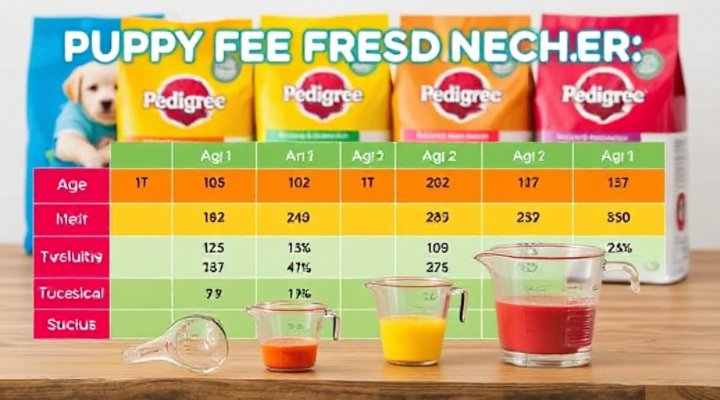Understanding Pedigree Puppy Food Nutrition
When it comes to choosing the right pedigree puppy food, understanding the nutritional content is crucial. Pedigree offers specifically formulated puppy food that supports healthy development during those critical early months. The brand’s puppy formulas typically contain high-quality proteins, essential fats, vitamins, and minerals tailored for growing dogs.
I remember when I first brought home my Labrador puppy, Max; choosing his food felt overwhelming. After consulting with our veterinarian and comparing several brands, we settled on Pedigree puppy food. What impressed me most was the transparent ingredient list and the specific nutritional targets for puppy development.

Key Ingredients in Pedigree Puppy Formulas
Pedigree puppy food contains several key ingredients that contribute to optimal growth. Firstly, high-quality animal protein sources like chicken and lamb provide essential amino acids for muscle development. Secondly, whole grains and vegetables offer carbohydrates for energy and fiber for digestion. Additionally, the formulas include omega fatty acids for brain development and healthy skin.
According to the FDA’s pet food guidelines, proper nutrition during puppyhood sets the foundation for lifelong health. Pedigree meets these standards while providing affordable nutrition that doesn’t compromise on quality.

Feeding Schedule for Pedigree Puppy Food
Age-Based Feeding Guidelines
Establishing a proper feeding schedule is essential when using pedigree puppy food. Generally, puppies under three months need four meals daily, while those aged three to six months require three meals. After six months, you can transition to two meals per day. Always follow the specific guidelines on your Pedigree puppy food packaging, as different formulas may have varying recommendations.
Portion Control Tips
Portion control is equally important. Overfeeding can lead to obesity, while underfeeding may hinder growth. Use a standard measuring cup and adjust portions based on your puppy’s activity level and growth rate. I found that keeping a feeding journal helped me track Max’s progress and adjust his Pedigree puppy food portions as needed.

Breed-Specific Recommendations
Large Breed Puppies
Large breed puppies have different nutritional needs than their smaller counterparts. They require controlled calcium and phosphorus levels to support proper bone development without growing too quickly. Pedigree offers formulas specifically designed for large breed puppies, which I discovered when researching options for my friend’s Great Dane puppy.
Small Breed Puppies
Small breed puppies, conversely, have higher metabolic rates and need more calorie-dense food. Pedigree’s small breed formulas feature smaller kibble sizes and adjusted nutrient profiles. If you’re considering other options, our guide on best dog food for sensitive stomach might provide additional insights for puppies with digestive sensitivities.

Comparing Pedigree Puppy Food Formulas
Pedigree offers several puppy food varieties, each designed for specific needs. Their complete nutrition formula provides balanced nutrition for most puppies, while specialized options address particular requirements. When comparing formulas, consider your puppy’s breed size, activity level, and any specific health considerations.
For puppies with particular nutritional needs, you might also want to explore our article on specialized nutritional solutions for sensitive stomachs, which complements what Pedigree offers for digestive health.
Transitioning to Pedigree Puppy Food
When switching to any new puppy food, including Pedigree, transition gradually over 7-10 days. Start with 25% new food mixed with 75% old food, gradually increasing the proportion of Pedigree puppy food. This gradual transition helps prevent digestive upset and allows your puppy’s system to adjust.
During Max’s transition, I monitored his stool consistency and energy levels closely. The AVMA’s pet nutrition resources were incredibly helpful in understanding what to expect during dietary changes.
Storage and Handling Tips
Proper storage maintains the quality of your Pedigree puppy food. Keep the food in its original bag inside an airtight container, store in a cool, dry place, and use within six weeks of opening. These practices ensure the nutritional integrity of the food and prevent contamination.
Common Questions About Pedigree Puppy Food
Is Pedigree puppy food suitable for all breeds?
Yes, Pedigree offers formulas suitable for most breeds, with specific options for different size categories. However, always consult your veterinarian for breed-specific recommendations.
How does Pedigree compare to premium brands?
While Pedigree is more affordable than some premium brands, it still meets nutritional standards for puppy growth. The choice often comes down to your budget and your puppy’s specific needs.
For those considering other training-related nutrition, our piece on Diamond puppy food with training tips offers additional perspectives on nutrition during training periods.

Real Owner Experiences
Many puppy owners report positive experiences with Pedigree puppy food. From my own experience with Max, I appreciated the consistent quality and the visible results in his coat condition and energy levels. The affordability factor also made it sustainable for long-term use without sacrificing nutritional quality.
One aspect I particularly valued was how easily Max transitioned to Pedigree from his breeder’s food. The palatability seemed excellent, and he maintained healthy growth throughout his puppyhood. For more training insights alongside nutrition, check out our advanced dog training techniques guide.
Conclusion: Making the Right Choice
Choosing the right puppy food is a significant decision for any new pet owner. Pedigree puppy food offers a balanced, affordable option that supports healthy development. By understanding the nutritional content, following proper feeding schedules, and considering breed-specific needs, you can make an informed decision that supports your puppy’s growth and health.
Remember that every puppy is unique, and what works for one may not work for another. Regular veterinary check-ups and monitoring your puppy’s response to their diet are essential components of responsible pet ownership.
Related Keywords: pedigree puppy nutrition, puppy feeding guide, dog food ingredients, breed-specific puppy nutrition, affordable puppy food, puppy growth nutrition, Pedigree dog food review, puppy dietary needs

